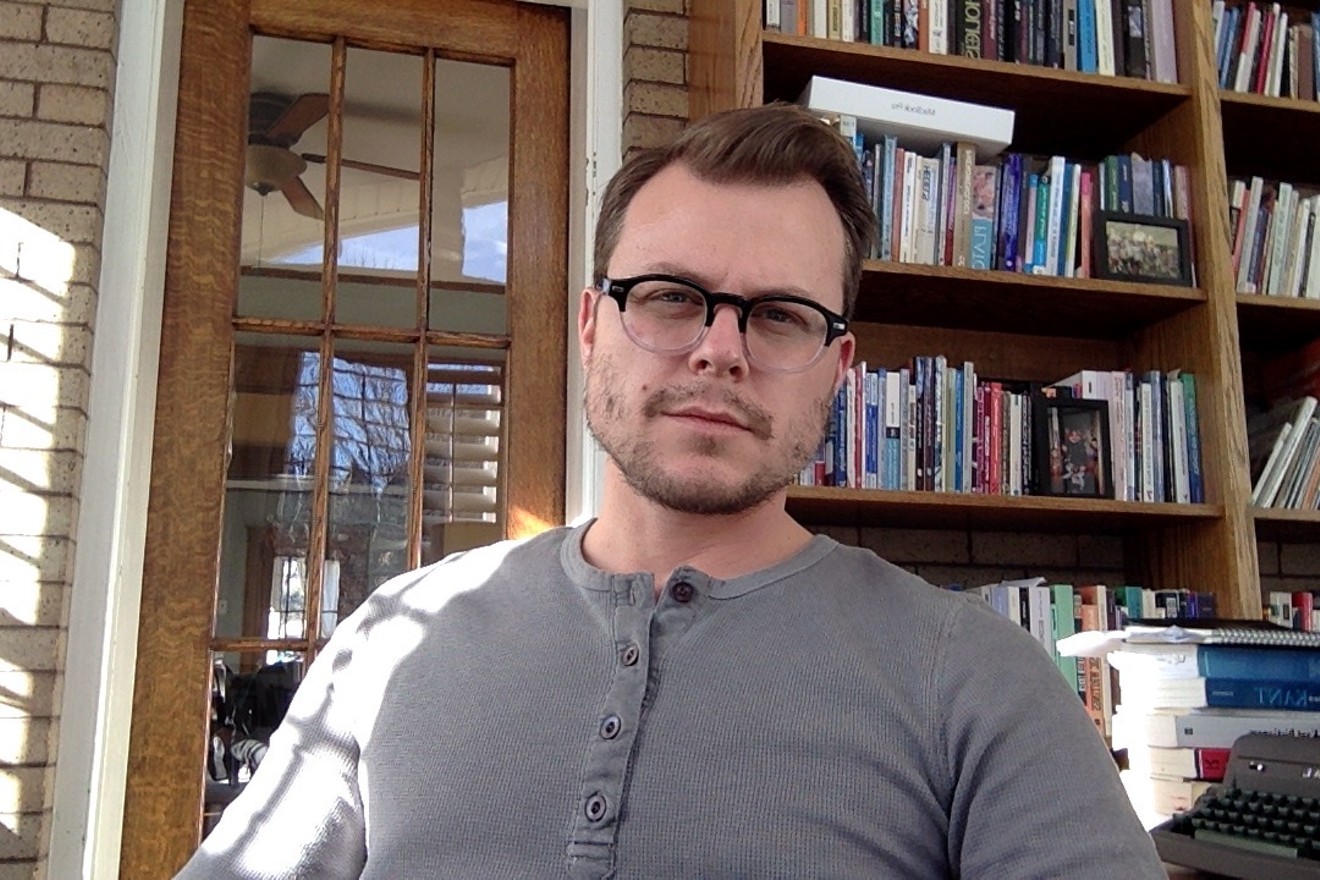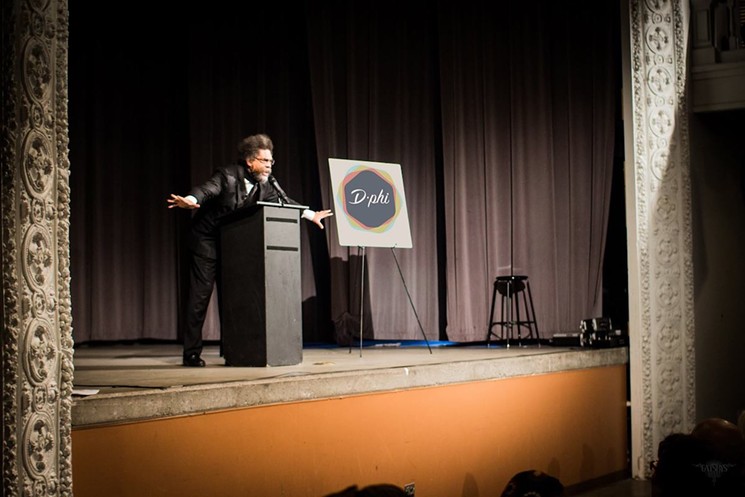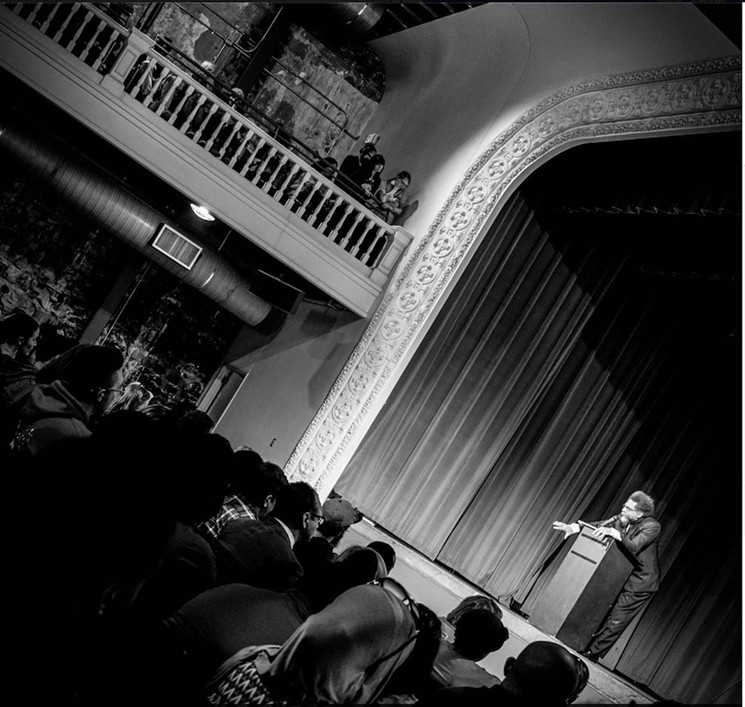#41: Adam Graves
Scholar Adam Graves teaches philosophy and directs the Religious Studies Program at Metropolitan State University of Denver, but that’s just not enough for a guy who earned a PhD in hermeneutics and phenomenology, and in his own words, “studied medieval Sanskrit literature in Varanasi, India, and managed a congressional campaign against tea-party figure Michele Bachmann.” As an educator, his real baby is MSU Denver's Project for Humanistic Inquiry (D-phi), a series of lectures, film screenings, performances and other cultural events designed not just to educate, but also to infuse audiences with a rich sense of interactive humanity, something no one can ever glean through interactions on the internet. Join Graves on a trip through intellectual and real-time worlds as he answers the 100CC questionnaire.
Westword: What (or who) is your creative muse?
Adam Graves: Dusty old books that few people, including those in my own profession, bother to read these days — such as the Dictionnaire Historique et Critique, an encyclopedic collection of philosophical biographies by seventeenth-century French Huguenot Pierre Bayle. At the turn of the eighteenth century, it was practically flying off the shelves (in fact, it was the most widely known book in France). His deliberately equivocal and occasionally heretical entries on philosophers, kings, gods, religious zealots and charlatans contain profound reflections upon the nature of evil, the problem of knowledge and the value of tolerance in an increasingly pluralistic society. It’s a riotous page-turner.
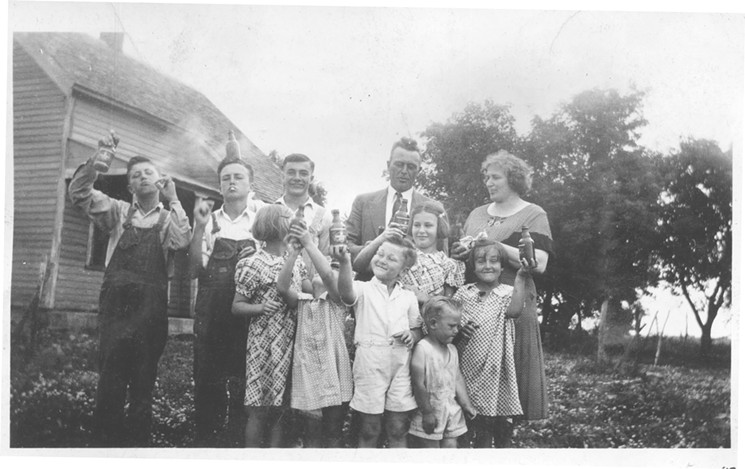
Adam Graves's grandmother Esther Terhaar Popilek and her German-speaking family, enjoying some beers.
Courtesy of Adam Graves
Since the question grants me the power to resurrect the dead, it'd be a shame not to use it.
So I'd start with my Grandma, Esther Terhaar Popilek, one of the most incredible people I’ve ever known. Growing up on a farm in central Minnesota, she and her German-speaking family clearly knew how to have a good time (see picture above).
I’d invite Louis Dupuy, former owner of the Hotel de Paris in Georgetown, and quite possibly the single-most interesting Colorado transplant in state history. Dupuy was an intellectual, polyglot, iconoclast and occasional swindler who spent most of his youth on the run — fleeing Paris for London, London for New York, New York for the Wild West — before finally changing his name, adopting a new identity and settling down in the small Colorado mining town. Judging from the books that can still be found on the shelves of his library — works by Nietzsche and Voltaire, for example — I imagine he must have been a truly pioneering pioneer, the leader of a secret, mountain avant-garde.
I’d round out the ghostly guest list with Orson Welles, master storyteller, amateur magician and once-upon-a-time bullfighter — three essential ingredients for any truly great party.
What’s the best thing about the local creative community in your field — and the worst?
As director of the Denver Project for Humanistic Inquiry, I’ve found that Denver institutions have a genuine enthusiasm for collaboration. Everywhere I go — whether it’s the Buntport Theater, the Sie Film Center, Ratio Beerworks, the Center for Visual Art or History Colorado — I’m finding creative people eager to try something new, even if at first it sounds crazy. Musicians, artists, poets, authors, scholars and philosophers have all stepped up to participate in our events. The success of these events is due almost entirely to the fact that they bring together people who otherwise inhabit totally distinct creative bubbles. Magical things happen when those bubbles burst. And D-phi is really good at that. But none of it would have been possible if the local institutions and individuals weren’t willing to take risks, and if the community wasn’t so enthusiastic about what we have to offer.
Worst thing: Our state makes one of the lowest per-capita investments in higher education in the nation; when you look at the numbers, MSU Denver gets especially short-changed. It’s unconscionable that our state doesn’t do a better job supporting an institution that educates so many Coloradans (and so many from underserved communities), most of whom stick around after graduation. I think it goes without saying that if Denver is going to become a world-class city, we need to substantially increase our investment in local institutions of higher education.
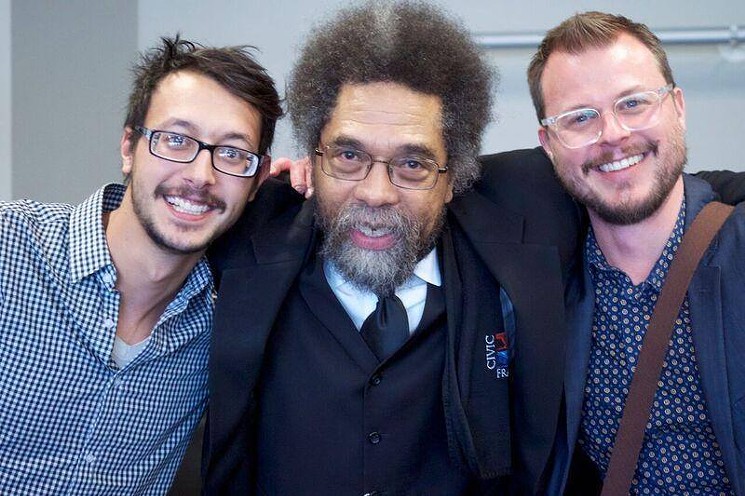
Adam Graves (right) hanging out with D-phi speaker Cornel West and D-phi project coordinator Gabriel Grinsteiner.
Courtesy of Adam Graves
I suppose no trend is worth following just because it happens to be trendy or trending. But the more I think about it, the less certain I am that I know what constitutes a “trend.” When, exactly, does a belief or practice become a genuine trend, and how long can it remain one before becoming something more than a trend, such as a tradition? The rise of social media and the 24-hour news cycle seem to have accelerated their cadence: nowadays, something like “trends” seem to spring up and dissipate in a matter of hours. One would have to have an absolutely blind (and, I think, misguided) faith in the inevitability of progress to want to jump on that sort of wagon.
The trends I follow, willingly or not, tend to be of the longue durée variety — ones that arise slowly, almost imperceptibly, over long expanses of time, shaping the ways we think and act in profound, though often unrecognized, ways. As a hermeneut (a philosopher concerned with language and interpretation), I am interested in what it means for us to be beings of the sort that are inescapably subject to these long-term cultural, linguistic or ideological “trends.” And one of my aims is to bring these trends to light in order to gain an awareness of the ways in which our thought has been shaped by them. Ironically, this aim is itself part of a long-term trend which dates back to the Enlightenment, or perhaps even back to Socrates himself.
What’s one trend you love and one that you hate?
Love: Hating on trends.
Hate: A trend that I hate — the now ubiquitous talk of “relevance” in our society. When people ask, “What’s the relevance of art, literature or philosophy?”, I want to ask, “Relevance to what?” My guess is that such questions express an uncritical acceptance of a neoliberal worldview in which every dimension of human existence is subordinated to the gross domestic product. (To be sure, harping on neoliberalism is quite trendy at the moment.)
One symptom of this mindless obsession with “relevance” is the increasing tendency to regard education as a mere tool — as a means to something else. I’m tempted to say that anyone who thinks about education in purely instrumentalist terms must him/herself be a tool. We need to buck that trend and reevaluate how we think and talk about art, culture and perhaps especially education. W.E.B. Du Bois once wrote, “The true college will ever have but one goal — not to earn meat, but to know the end and aim of that life which meat nourishes.” I couldn’t say it any better.
What’s your best or favorite accomplishment as a creative?
Setting Finnegans Wake to music. I was fifteen, and in terms of sheer creativity, it's been mostly downhill ever since. That said, at its very best, philosophy is itself a highly creative activity. It not only involves envisioning new perspectives from which to view our world, but imagining a vantage point from which we can view how we view the world at all. Explaining how one’s particular contribution to that activity is creative would require more words that I can offer here. Suffice it to say that it can be a dizzying exercise that one should never attempt to carry out for more than twenty minutes at time.
Helping to create D-phi has also been an immensely rewarding experience for me, especially since nothing else quite like it exists elsewhere. Our creatively orchestrated and often irreproducible events engage and inspire audiences well beyond the walls of the academy. Take, for example, our event with Lucero’s lead singer, Ben Nichols, who recorded an album based on Cormac McCarthy’s Blood Meridian. Ben performed the album and then sat down with Western historian Matt Makley and philosopher Sean Morris at Ratio Beerworks to discuss the creative process and the history of “the West” in the American imagination. So what happens when a rock star, a historian and a philosopher walk into a bar? D-phi, of course!
You’ve come this far in life. What’s still on your bucket list?
One day, I’d like to track down a long-lost friend of mine: Passang Tamang, a native Sikkimese who lived in a small hut which barely clung to the side of a mountain. We spent several months traveling through the Himalayas together nearly twenty years ago. I’ve spent hours searching for him online, but to no avail. Unfortunately, roughly half the males in that corner of the world share his name.
I'd like to try to make a feature film one day. There's a venerable tradition of philosophers going on to make movies: Terrence Malick would be the obvious example, but also Ethan Coen. If Orson shows up to my party, I’ll ask to borrow one of his many prosthetic noses.
Denver, love it or leave it? What keeps you here — or makes you want to leave?
Love it, and then leave it (in order to love it again). If I had no means of escape, I would be completely miserable here. Happily, my research and teaching frequently take me abroad, and my wife and children share my sense of wanderlust.
Who is your favorite Colorado Creative?
Does anyone ever answer this question with just one? In addition to my wife, Suchitra Mattai (more about her below), Aaron and Amanda Kopp, makers of the award-winning film Liyana, which won Best Documentary at the LA Film Festival and recently screened at the MoMA (in NYC, of course). They are exceptional filmmakers and amazing people.
Speaking of film, I’ve been really impressed by the work of Matthew Campbell and the entire creative team at the Denver Film Society and the Sie Film Center. Their work is so important to the cultural life of this city.
Last but not least: Andrew Norman, the sage barista-thespian-philosopher who serves bottomless cups of erudition most mornings at Lula Rose General Store — the one-stop shop for your daily dose of caffeine, Kierkegaard and Kurosawa.
What's on your agenda in the coming year?
I’ve a bunch of writing projects to finish up: an essay on the concept of authenticity as it relates to identity politics, an article on the hermeneutics of evil, and a book on freedom and confession. The book is by far my most ambitious project. In contradistinction to traditional philosophical discourse, which makes freedom a necessary condition of responsibility, I try to show how expressions of responsibility — expressions of guilt, apology and confession — configure our sense of self and create the conditions that make autonomous action possible.
But I’m also working around the clock to take D-phi to the next level — building new partnerships, dreaming up creative ways of engaging the community, developing thought-provoking events and raising the funds to pull it all off. I’m also excited that Martha Nussbaum, one of the most influential philosophers and public intellectuals alive today, will be coming to give D-phi’s keynote lecture in the fall.
Who do you think will (or should) get noticed in the local academic/arts community in the coming year?
My wife, Suchitra Mattai, is sure to get more notice. She’s on fire, with three solo exhibitions coming up in the next year (including one at MSU Denver’s Center for Visual Art) and countless group shows. Her creative genius literally knows no bounds — her work has outgrown her studio in the Temple, overtaken our garage and is now encroaching upon our living room! She has an almost scary level of energy and creative vision, like nothing and no one I’ve ever known. I think she may be possessed. If you already follow her work, you know what I’m talking about. If you don’t, you soon will (or should).
Samuel Clare Knights is a local author whose first language was ASL (both of his parents are deaf). His short story, “The Manual Alphabet,” which recently won the PEN America Best Debut Short Stories award, draws from memories of his childhood in order to explore his unique linguistic inheritance. It’s part of a larger book project, which I can’t wait to see in print.
D-phi hosts “Shakespeare in the Parking Lot,” an abridged version of A Midsummer Night's Dream, in collaboration with the Denver Center for Performing Arts, today, March 29, at 3:30 p.m. on the Tivoli Commons, 900 Auraria Parkway on the Auraria campus. In case of inclement weather, this event will be held in the King Center Concert Hall at 4 p.m. Admission is free.
From 2 to 4 p.m. on Thursday, April 5, D-phi will present Charlottesville, After “Charlottesville,” a discussion with Victor Luftig (professor and director of the Center for the Liberal Arts, University of Virginia) on the future of social activism, in the Student Success Building, Room 400, at 890 Auraria Parkway on the Auraria campus. Admission is free.
Keep up with continuing D-phi programs online, or visit the D-phi Facebook page.

